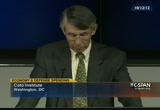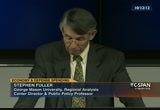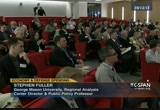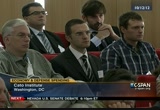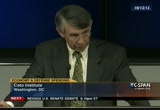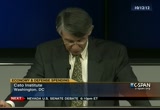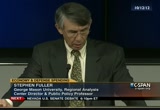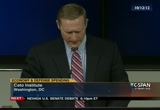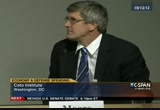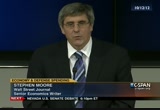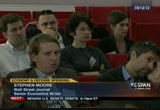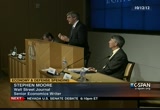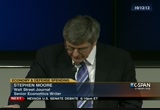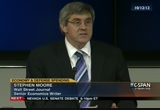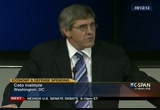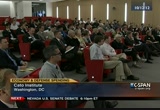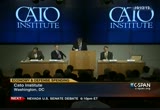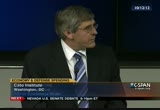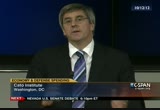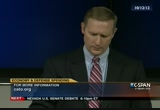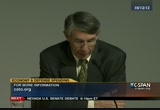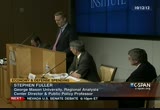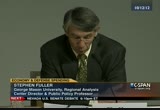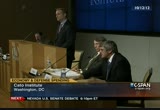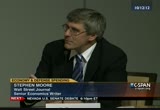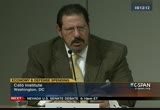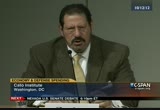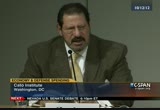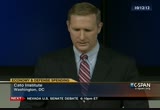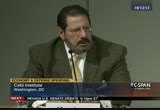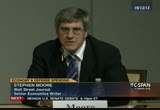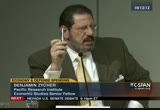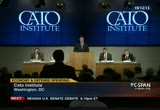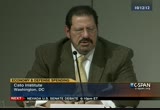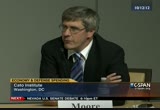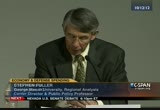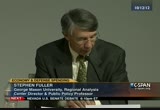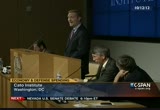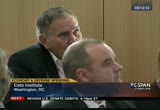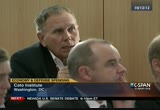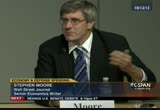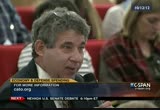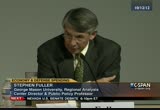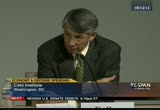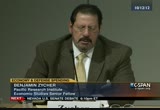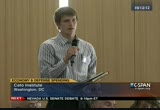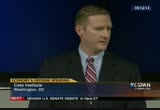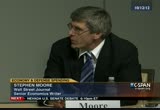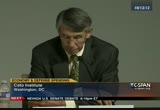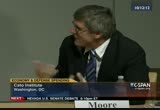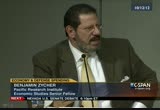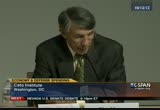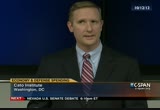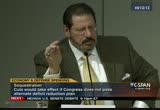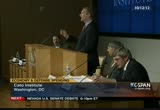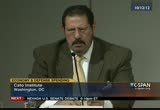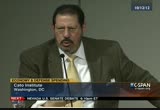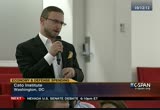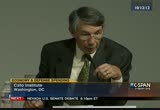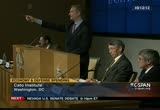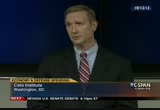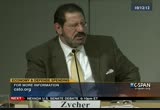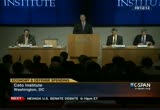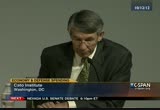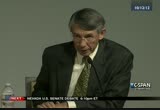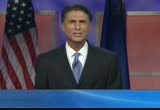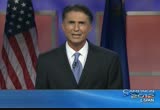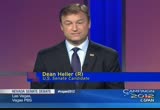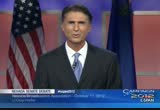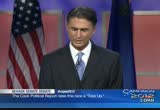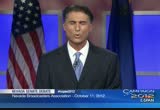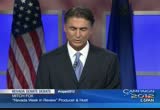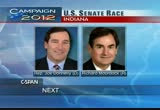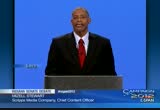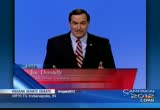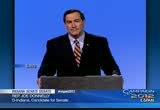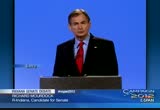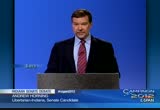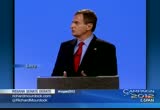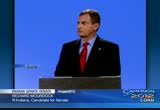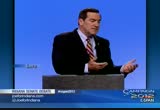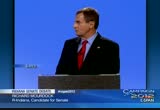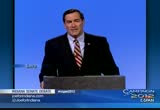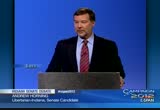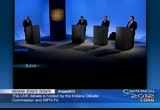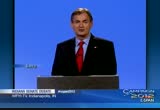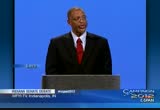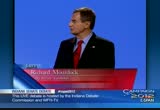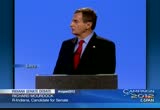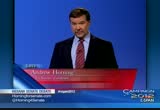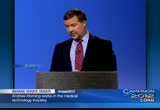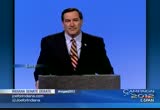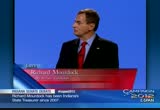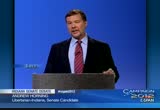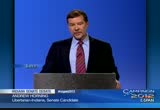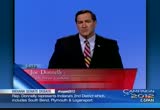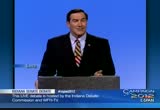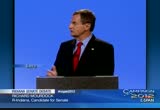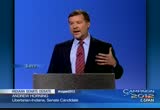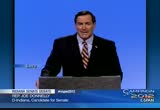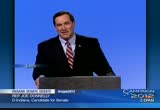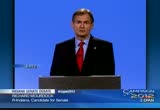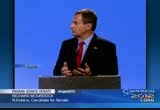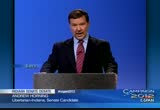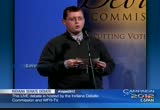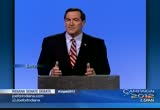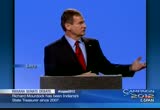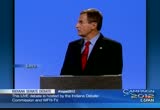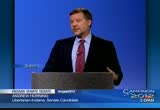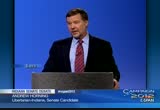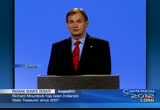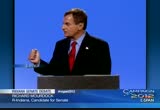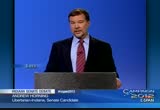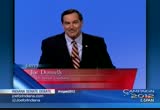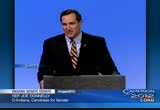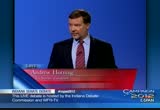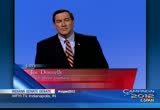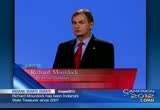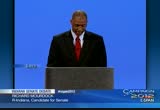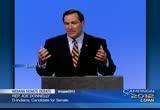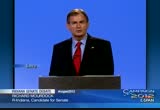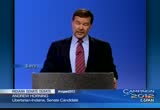tv Public Affairs CSPAN October 15, 2012 5:00pm-8:00pm EDT
5:00 pm
ben bernanke has been working on that. that is a different study, too. what i have reported and which has been presented here to some degree is a way to calibrate what the costs and reduced federal spending are. it is not complete. the more recent study which looked at federal spending that affects payroll as well as procurement, and not just military equipment, as ben cited, but across all discretionary categories, would it cost $215 billion in lost gdp activity. that is two-thirds of what is projected to grow if the
5:01 pm
economy grows at somewhere around 2.9% next year. that is two-thirds of gdp. about $110 billion in labor income is associated. $40 billion in federal payroll. to understand what is tied to that spending, the analyses i undertook put some jobs to that, about 141 million jobs across all sectors of the economy. right off the top, about 277,000 federal jobs. nobody has a addressed with the disruption to the private sector would be from the loss of those federal jobs. you cannot assume that those 277,000 federal workers do not do something.
5:02 pm
i guess you could assume that, but if you are flying from one to the other, some of those workers are flying. meat inspection, research at nih, the department of education -- their grants would not be cut back, but who would administer them? national parks would be closed. not just for a day. for a year. at cutbacks and do not start on the second. most agencies will not do this on the second. you'd better wait and see if it is real. i cannot imagine it would happen, but if it is real, already 1/4 into the fiscal year by that time, so the cuts are much deeper because of the period to achieve a year's reduction is now six months.
5:03 pm
they are deeper and sharper. this has impact on the economy. you and i are affected. passports -- you need to get a passport? it will take longer. port inspections. these have costs. i am not arguing you might not be able to do it more effectively in a different manner. that is another story. i suggest the collateral effects are more important than the ones i have measured. these have an impact on small business. small businesses disproportionately provide support, the vendor and supplier services, the subcontractors services, and the induced services that are supported, retail consumer services, other services that are supported by labor that would be reduced. you cannot just do that in the private sector because it was not real money to begin with.
5:04 pm
it was all borrowed. the private sector cannot generate it in 2013. 2021, quite likely, i would not want to argue the economy would be better off in 10 years, but next year it will not be better off. small businesses account for 50% -- a 58% of the suppliers and vendors, subcontractors, and businesses that support, are supported by labor income. many of these i have not studied and have only anecdotal information, but i am told if they lose a contract, up to 20% of their business, they have to shut down. we only measure what is lost if you take a federal money away, but there is a consequence. most businesses are not publicly traded. most small businesses do not have a big backlog, do not have geographic location. they are specialized.
5:05 pm
they do not have funds to offset losses. they fire people really quickly. you lose specialized skills, and ultimately a number of businesses -- so there are secondary effects on the small side of business impacts. the question here, i do not have too much time, if we are concerned about reducing the federal budget, which i think it is hard to find somebody that should not be concerned about that, we're all concerned about being more efficient in the use of federal funds, our tax dollars. the question should be, how do we do this to minimize the short-term effects so we can get a long-term benefits? how do we do it with the least disruption to the business sector, the private sector, from the elimination of unnecessary jobs?
5:06 pm
some regulation helps. food inspection is a good thing. maybe not all that, but certainly most of it. how do we reduced, knowing what the negative effects are on some order, how do we minimize these? how do we become more strategic in this activity? workers will not be employed right away. they are pretty smart, they will get employed at some point. it is a very weak economy to be doing this kind of spending shifts, because it does not shift smoothly from public to private sector and it does not produce tax reductions which give you more disposable income. the theoretical discussion versus more applied discussion may leave room for discussion ourselves. thank you. [applause]
5:07 pm
>> let me introduce our third speaker. i said i was pleased to welcome dr. fuller. and pleased to welcome back stephen moore. steve splits his time between washington and new york, focusing on budget, monetary policy. he was the founder of the club for growth, and was the president of a group called the free enterprise fund. he worked for the joint economic committee for congress. he was a senior fellow the cato institute. you published a number of studies, including the president's report card, right? he was a consultant to the national economic commission in 1987 and the research director for a research commission under president reagan. steve moore.
5:08 pm
[applause] >> good afternoon. thank you for inviting me back. it is terrific to be with you. i am a george mason economics graduate. ben, i love your study. it is a fantastic piece of work. thank you for writing it and doing the analysis. i agree with the entire study, and it is spot on. he said most all the things i would like to say, so let me address a couple of things points of emphasis. by way of starting, i'd want to say i was privileged for many years in the 1990's and through the mid 2000's to a couple times those years to have lunch with milton friedman. it was an awesome experience. rose would be there.
5:09 pm
oftentimes others would go, and we would talk about the economy, and i got to learn economics from the master. during my last conversations, i said, what are the three things we could do over the next 20, 50 years to increase the rate of economic growth in this country? he said school choice, which is something he had pursued aggressively. number two, free trade, and the third thing he said was cut government spending. i said, milton, by how much? he smiled and said by as much as possible. i think that is an interesting insight. if milton friedman were alive he would agree with everything that ben has said. one of the things i find interesting is that the argument against doing these cuts and facing this fiscal cliff is this reduction in government spending will cost all sorts of economic disruption, and a lot of the
5:10 pm
points that professor fuller made are correct. i think the broader point is this is a keynesian idea, that government spending will stimulate the economy and a reduction in spending will de- stimulate the economy. as i look at the evidence, it has never worked. there is no evidence that these ideas work. they did not work very well in the 1930's. they did not work for president bush when he tried to do a keynesian stimulus in 2008, and it did not work when we had the biggest keynesian experiment in the history of this country, which was in 2009, where the unemployment rate went up. i have looked at studies -- why didn't the stimulus work? why did the unemployment rate go
5:11 pm
up as the spending was going up? the evidence is pretty clear. what happened, for every dollar of increased government spending, private sector spending went down for a dollar, and that is because milton friedman had it right. there is no such thing as a free lunch. of the government takes a dollar out of something, it has to come from somewhere. there is no tooth fairy out there. professor fuller is right that the most immediately impact the way to pay for this would be to approach spending by increase taxes. that is not what is suggested here. the spending is being mostly financed by borrowing. i am not as -- as you are for -- i am not as a salutary as you are about what the effects are of borrowing. somebody has to buy the bonds. taxes. every dollar you borrow, that means somebody has to pay for it, and every dollar spending is still taking a dollar out of the economy.
5:12 pm
let's look at some of the evidence. one of the things i have looked at is exactly what happened inby my measurements, we cut about $100 billion in real terms out of the defense budget after the berlin wall came down. this was a significant reduction in defense spending. about as big as they are talking about right now, and perhaps even bigger. at the time there were all sorts of apocalyptic claims about what would happen if we did these, and in states like virginia, that are heavily impacted by defense spending, and your state of california, those two states are impacted most. california did go through a recession in the early 1990's, and people blame that on defense cutbacks. virginia took about the same
5:13 pm
amount of cuts and we did not experience the same recession. we found ways to grow in other areas and replace those defense contractors with other areas, etc. that is a really good example. i am so glad you brought it out. a couple of points for conversation. we had another cut in spending that we did that was similar to this, not of the same magnitude, back in 1987 when we had the gramm-rudman, the first sequester. you probably know the numbers, professor. i forget how much it was. the average cutback was on the magnitude of 3%. that is not as big as we're talking about now. it is interesting to see how federal agencies responded. the way they responded is they could save money. we did not see a reduction for the most part and vital -- in a
5:14 pm
vital services. i agree with you on the programs you mentioned, like food inspection. that is a critical function. what we found out is these agencies were able to find ways to cut inefficiencies out of their budgets and we were able to save money without a recessionary impact. the idea that these federal agencies cannot take a cut of 6% i think is this proven by what -- is proven wrong by of what has happened in the private sector. one of the things that happen in the recession is businesses did take -- and a lot of small businesses and large businesses as well, they went through this recession, the way they survived, they found ways to reduce their budgets and their spending by 5%, 10%, even 20%. if you look at their balance sheets now they are very healthy.
5:15 pm
if private sector companies can do that, the government can do it. it would be one thing to say it would be hard to take a cut. it depends on how long the sequester goes on. we're not talking about a one- year sequester. we're talking about a series of years of this. where the cuts get deeper everyi want to remind people that year. these federal agencies, the agencies on the domestic side, they lived through a massive increases in their budgets. if you look at the budgets the budget committee has come out with, the average increase in spending on these agencies because of the first budgets under obama, their budgets increased by over 60%. can it take a cut? my answer is yes. i think they can. the last point i want to make is something you were talking
5:16 pm
about, professor. there are lot of ways to do this other than a sequester. it is a mindless machete. the problem is they will not do the other approaches. they could sit down and we could come up with a much more efficient way to make cuts that need be made, but just take an example of what happened last week when during the debate mitt romney brought up maybe we could cut corporation for public broadcast spending. in the last week, i see these ads where he is got to cut big bird, elmo, and that is one cut in a tiny program. we could live without the
5:17 pm
subsidies. think about if you could try to come up with a laundry list of programs that could be eliminated. that would be a much more efficient thing to do, and we agree it would be much more efficient to cut medicare and social security and these big entitlement programs rather than some of these smaller programs. they will not do it. the republicans have made a strategic mistake politically in saying we do not want to do the subsidies. the defense sequester, because in my opinion the only way you're going to drag democrats who do not want to cut the budget, the only way you will get to the table is you have to do these sequester cuts, year after year, until democrats say we cannot take any more, we will have to make sure warren buffett does not get medicare or we will raise the and retirement age. i would make the case that one of the benefits is you keep squeezing these programs and finally the politicians will cry uncle. i am positive. i am extremely concerned.
5:18 pm
it is a disaster if we do that tax increase next year. that will very easily cause a double-dip recession. the economy cannot handle the increase in the personal income tax rates. you're talking about severely damaging effect on the supply of goods and services on businesses, investment, at the time the economy is fragile. we should make sure the tax sequester does not happen, but for the first year i am in favor of the sequester on the spending side, and, ben, thank you for writing this important paper. [applause] >> thank you, steve. since my speakers were so efficient, i will exercise the moderator's privilege and ask a question myself, and picking up on steve's last point. in your study, dr. fuller, the one that looks at the economic
5:19 pm
impacts of the one from july, that looks at the impact of both dod and non-dod spending cuts, you found a different effect. your assessment was the cuts to non-defense spending would have a more harmful effect in terms of job losses and economic activity than with the defense spending, which is different from what others have concluded. i wonder if you would comment on that. to the point which is what would be the economic effects of tax increases to cover the debt in lieu of sequestration, have you looked at that in the past put the you have a sense of that? or either ben or steve want to weigh in on that as well. >> and we have how long? >> not much time.
5:20 pm
i want to save room for the audience to ask questions. [laughter] >> the big difference between the proposed cutbacks in dod and non-dod agencies is non-dod agencies are largely labor driven, payroll driven. they do not have big procurement budgets. the almost equal reductions, a little bit greater, but let's call them equal, largely take a toll on labor income, goes into the country differently and would cost us 230,000 federal jobs right off the top at about $30 billion in payroll spending. that has a much different impact on the economy, the loss of that, whether it just before the first year or temporary short-term loss of that, would have a much bigger impact than the impact on dod, which has only 48,000 civilian payroll jobs at stake, and the rest are contractors. contractors spend the money
5:21 pm
differently. the money moves to the economy in a different fashion. the total impacts are not too different. it is the timing of it. i would want to suggest that dod has already taken a big cut, when we talk about opportunities to cut further. they already have begun implementing a $487 billion 10- year reduction. >> against the previous baseline. >> correct. they are making some reductions, and that non-defense agencies have at most, outside of homeland security, have not had much in the wake of spending increases in their 2011, 2012, or 2013 budgets. their budget is already tighter as we squeeze them further. the opportunities to cut back
5:22 pm
are more difficult, 2% is a lot easier than a 9.1% one. it would be a very bad policy move to increase taxes to try to pay our way out this problem. some taxes, some entitlements, are going to have to be adjusted to change the revenue flow slightly and hopefully grow the economy stronger and reduce some spending. i think that analysis is beyond the ability of congress to figure out in the time available. that clearly would produce a better answer. the fiscal cliff, taxes, almost universally, i have not heard anybody say it would not drive the economy into recession next year. i think that has to be avoided. it is a very fragile economy at this point.
5:23 pm
>> if you read editorials, you know we are against defense sequester cuts, and that is not because we think defense spending is efficient for the economy. it is because we are concerned about the national security implications of these cuts. there is an important distinction. if we need to spend the money to keep us safe, absolutely we should spend the money. what i object to is the idea that spending the money will be good for the economy. this is a dangerous world. we have already, against the baseline, made significant cuts, and there's no getting around it. these would cause a pretty big reduction in troop levels, military equipment, our strategies in terms of dealing with homeland security. the point i am making is we should make this decision based
5:24 pm
on national security, not based on some kind of keynesian stimulus to the economy. >> the effects of sequestration would take the budget close to 2007 spending levels. >> i would like to add something. one point -- we have 2,500 m1 tanks in inventories, something on that order. where still producing them. -- and we are still producing them. why? they are produced in ohio, and ohio is a swing state with 13 electoral college votes. it is not because we are worried about the russian army pouring through the fold in the gap anymore. steve is quite right when he says i am right -- [laughter] the issue is what are our vital interests, what is the force
5:25 pm
structure needed to defend them, and what is the cost of that force structure? it is not whether there is going to be increased short- term unemployment anywhere. the second point, steve i think unintentionally has kind of slipped into a washington monument game sort of problem in which he talks about the passport office and -- >> you have to be specific about which steve you are talking about. >> steve fuller. you guys do look so much alike. the argument that somehow -- assume away the privatization issue, a debate for another day -- the argument that there are
5:26 pm
not things we would cut first at a lower marginal value and the passport office and the rest, the drug war, militarization of federal law enforcement -- why does the food and drug administration have a swat team? i have not gotten a straight answer to that question. i have asked it many times. the destructiveness of the entitlement programs. to give one example, people argue with a small tweak to the indexing formula for social security we could make it solvent for the next 80 years. true enough. that does not do anything about the economic damage caused by the social security system causing people to save less. steve -- i think steve fuller is slipping without thinking about it too carefully, and, as i interpret this comment, has
5:27 pm
joined washington monument game, which is dangerous. let me to return, steve fuller, to my current example. if crime rates fall and there is a reduction in the size of the market for private security services, and there is a short- term unemployment among those who otherwise would have provided private security services, tell us why that is a problem. please. >> he will do that in response to another question. thank you, gentlemen. we have time for questions. please wait for the microphone. please identify yourself and your affiliation, and the "jeopardy!" rule applies here. no speeches, please.
5:28 pm
who is first? over here? >> the question is for dr. fuller. or anyone on the panel, really. we mentioned that if the sequestered does not occur, then taxpayers will be financing that additional pentagon spending. i am curious if you or anyone on the panel has analyzed the job loss impact that we would incur as taxpayers have to pay that back with interest? >> i have not analyzed that. >> would either of you care to speculate? >> a person at boston university has done work on that issue -- what are the effects of
5:29 pm
exponentially increasing government debt, and i would not confuse that with interest payments. those are the two sides of the same coin. the present value of interest payments -- i would be careful about that, but i do not remember his most recent estimates. if you go to the boston university website, you will find a lot of work on that topic. >> spending is taxes. the counterpoint of your question is they are not going to raise taxes now when they do the spending. that means they will do it later. a perfect example is the stimulus bill. it did not create jobs. all we got for it over the last four years was all this accumulation of debt. now we hear in the debates we have to raise taxes to pay for this debt. it is pay-me-now or a pay-me-
5:30 pm
later approach, and that is a valid point, that at some point spending always has to be paid for, and one of the ways we pay for it is taxes. there is a lot of talk about fairness out there. how is it fair that people who are not even born yet will pay for a lot of spending we are doing now? >> you do not believe we are not just going to inflate it away? the average maturity of bonds now is 5 1/2 years, i think, most of which is not indexed, and the chinese hold lots of it. they do not vote. at least they may make campaign contributions, so it strikes me in my way of thinking that the incentive to inflate away some substantial part of the debt is enormous.
5:31 pm
i cannot envision a world 10 years from now in which the inflation rate is not substantially higher than it is now. >> in the back. >> i have known steve for about 15 years. i consider you a personal friend. it is too late to get out of the stock market. you scare the hell out of me. >> you did not have a question to ask. next. >> at least he kept it short. >> i have a question for all the panelists. forget your potential political favoritism, but how does the idea of allocating 4% of gdp for defense spending play out in
5:32 pm
an economic sense? is there an example somewhere else in the economy that is basically done, and how does that affect the economy? >> percentage of gdp is a measure of what we can afford. it is not a measure of what we need. once again, we cannot talk about the required size and composition of the defense budget without doing some kind of serious analysis of the u.s. vital interests. i have not done that, although i have done some writing on that, but that is what is necessary. the point of the paper is that
5:33 pm
the public discussion is really not focused on that much more relevant question. what is really focused on is an irrelevant question, which is what are the short-term gdp effects of changes in the defense budget, and by implication, other changes in the budget as well, which is the wrong question. the question is, where are the resources used most productively in the coming, and what is the path that to take us there? percent of gdp is not really there, except in terms of -- -- as a measure of what we can afford. >> you talk about reduction of spending in the 1990's, but the domestic budget shrunk as well in the 1990's. bill clinton was in office, federal spending was 22% of gdp. eight years later, we were a little over 18%.
5:34 pm
that is a big cut in the cost of government. that was the biggest boom period we ever saw in this country. the economy never did better. i do not see evidence that these cutbacks in spending -- i agree with professor fuller that doing it rapidly overnight will cause some dislocation. i think the medium- and longer- term effects of this will be quite positive. >> i agree with steve, and in that ben as well, and respect what the long-term benefits are. the issues i have raised -- and it is beyond the washington monument in fact -- is that a cut in federal agencies uniformly, which is almost what sequester requires, does not
5:35 pm
allow federal agencies to decide they can just do 2% this year and 3% or 10% a year later. they have to go in there and cut severely. dod has already started that process, and their ability to maintain their levels of readiness as is required of them, they claim at least, i cannot judge this, are already close at hand. they do not need any more tanks, but they might need more drones. when i testified before the house armed services committee, they said -- i do not know this to be true -- that they had never worried much about the economic impact of cutbacks. they were worried about the ability to complete the mission of defense and readiness.
5:36 pm
democrats and republicans both said we cannot have these impacts, but they could not agree how they would avoid them. that is the issue today. >> we have done work on the 4% question, trying to calculate how that would be. i see the romney camp is claiming these numbers are made up, and that is fine. please tell us what you think the additional cost is because presumably someone there has done the math. one other point on spending and defense. it is true the total military spending as come down very slightly over the last few years with inflation-adjusted dollars. most americans think that is a good thing.
5:37 pm
the base pentagon budget in inflation-adjusted dollars remains close to its historic high, in spite of -- >> relative to inflation? >> y, it is basically flat, and you can go back to 2007 levels, a historically high point, but under current projections, the base budget holds constant and increases vary slightly. yes, sir, go ahead. >> i would like to have a small disagreement with mr. zycher. you said defense spending or any other line items could be measured in terms of what we could afford as look as a percentage of gdp. i think that is the wrong benchmark for us to use.
5:38 pm
let me just say no private sector organization in the world would ever use the number of widgets it produced to determine where it should invest its money in the future. rather, profitability is the key. they have to use it. we should do more of the same. instead of a soviet-style outlook as far as our government spending is concerned, we should be concerned with what we really have left at the end of the day. we know it is deficit right now, but that is all the more reason why both sides of the question should have to be looked at, the spending side and the revenue side. my question is, and i think mr. fuller might shed some light --
5:39 pm
the spending side and the revenue side. when we look at productivity, when we look at the line items of the budget, the difference between spending the money on the military hardware versus spending the money on other sectors of the economy, not just on the multiplier effect on jobs and the velocity of money in the economy over the immediate years, but long-term productivity gains -- research and development, what a train would produce, let's say, in terms of moving freight. >> just one quick comment on this. i love what you just said, and i agree really so much with it. look, one of the problems with government, because there is no profit in government by definition, is that we tend to measure committed to these things by how much we spend. the perfect example -- well, with the military budget -- the president keeps saying that we
5:40 pm
will improve education -- we measure education by how much we spend, not by test scores and other things. that is a very big efficiency of government did you are quite right. if we actually measured education, we would get better test scores. >> ok, here. >> david eisenberg, huffington post. because i have heard different things during the course of the presentation i want to get clarity. my question is this -- to dr. fuller and anybody else who wants to respond -- over the years i've read literature on what would spend to turn military-industrial complexes -- is the least efficient way to create jobs. almost anything would be better
5:41 pm
-- digging ditches, solar panels, whenever you want. if that is true, would we not actually be pleased that a possible sequestration would be cutting money from the least efficient job producing aspect of government? >> thank you. oh -- >> it's ok. he directed it to dr. fuller first. >> i don't think i will argue with use that money spent in government is less efficient than the private sector. addressing it in terms of job creation, i might produce a different outcome than i reported.
5:42 pm
if you take $51 billion out of dod, 57 or whatever the numbers are out of non-dod, is it going to have an impact on employment? is there some aspect, some economic consequence we are aware of in making that decision? if you take $51 billion outis t? with jobs created efficiently? if you buy your plans, with -- if you buy fewer airplanes, will there be pure airplanes in the manufacturing jobs? yes. what would those people do? something else other than manufacturing airplanes. is that good? i'm not sure. does it cost us something?
5:43 pm
yes. unemployment does have accosted -- does have a cost. this would add a point or a point and have to the unemployment rate. is that good? i cannot imagine anybody arguing that it is a good thing, not in the short term. you have to look at this in those terms and then decide how we minimize those kinds of consequences and chief loss of federal spending and more growth in the private sector. i would love to have that discussion. >> the premise underlying your question -- forgive me -- is precisely wrong. jobs are a cost of government spending, not a benefit, as counterintuitive as that may seem. why? suppose president obama were to say "my energy policies will increase the use of high- quality steel." that would be great for steel producers and steel workers, but for the economy as a whole, that is a cost, because the costs associated with steele would not be available for other uses. that is a classic definition of an opportunity cost.
5:44 pm
similarly, government spending that consumes labor, or the labor consumed by government spending programs -- that can no longer be used in other sectors. government spending programs, the employment created by government spending programs has to come out of other economic sectors, whether it is the government sector or the private sector. therefore, it is an adverse effect, the cost, not a benefit in the aggregate of the government's spending program. again, as counterintuitive as that may seem. >> government does not create jobs, it moves jobs. next. back there. >> coalition of service
5:45 pm
industries. the way i see it with regards to sequestration or the budget deficit in general, you have two options. one, do nothing, and let sequestration kick into effect. the economy could shrink and there could be a negative impact it the other is to do something, and that would involve some adjustment of tax policy or spending policy. however meager it is, if we do something it will increase the size of the bubble, or risk increasing the size of the bubble, and that it only furthers our dependence on the government intervention, whereas it could be the source of a problem. my question is, can you please respond to that? it is clear to me that to do nothing would be better and let this happen and let the dust settle and move on, rather than increasing the size of the bubble. >> thank you for your question
5:46 pm
pre or maybe to rephrase it, if doing nothing is the solution, -- is not the right solution, what was the grand bargain or solution that was tried and failed numerous times in the last few years? >> the reason we have this whole discussion is that the debt talks blew up. i think that is because the democrats would not agree to anything that did not have a major tax increase, and the republicans were right under that circumstance to walk away from the table. i do think that joe biden had a point last night, one of the few points that he had, which is that it is true that the republicans agree to this. this was the deal, that if we cannot reach the agreement, we will do these cuts. they're kind of going back on it now, saying that we did not literally mean tax cuts. well, everybody knew what the default position was if we did not come to an agreement. the point i was trying to make is that it is important to do it sequestration because it makes it more likely -- it will cause
5:47 pm
pain and suffering, no question about it, but it makes it more likely that we get some sort of real progress on these bigger issues about runaway entitlements the big things that need fixing. >> you have offered only two choices. i have been arguing that there was a third, fourth, fifth, sixth. i do think that the sequestration was the poison pill, and is slowly getting people's attention. it has taken a long time. it would be awful if that is what it takes for the congress to come to terms and workout a solution to tax policy and spending policy. there are other choices, and that is what i would argue for.
5:48 pm
>> i agree pretty largely with steve on this. the sequester has the virtue of not forcing congress so much but the electorate to make the choice. i think that whoever wins the election in three weeks will have a mandate to assume, or can claim a mandate plausibly to move forward with something other than a sequester if that is what the electorate indicates. the sequester is quite useful tool for forcing both of the electorate and congress to make decisions. >> can i ask these two guys a question? i would like both of you, if you feel up to it, to address this issue of about -- i've heard a lot of arguments made by some people saying, you know, the defense department is a major driver of technology, the defense department is what does the internet, cellphones, all these technologies. i don't know enough about it, i am not an expert on this, but i
5:49 pm
wonder if you could discuss that. is it pro-investment to spend money on the military? maybe the other argument is that if we are not wasting its money on things we don't have to spend on in terms of military systems, it might enhance technology. what is your view on that? >> my view is a two-part answer. a, the purpose of defense services broadly speaking is to defend capital against foreign aggressors, foreign to structure, both physical, human, etc. to the extent that the defense budget is too small, you might get too little investment. that is a reasonable argument. i don't think we are in that world, but that is a reasonable conceptual problem. the second point is how did we ever move from caves to buildings, from fire to telephony, etc., without a
5:50 pm
massive defense structure? some sort of under-incentive in the private sector to engage in that investment -- i am not convinced of that, but that is not an unreasonable argument. but other than the corporation income tax, which forces the private sector to use to buy a discount rate, i don't see any reasons to believe that the market invests in technological advance to an inefficiently small degree. i have never bought the argument that you have to have a large defense the establishment to drive the efficient amount of technological investment. i just don't buy it. >> there has been a lot of attention given to innovation that is underwritten or supported by federal spending that could be lost, whether it is the national science
5:51 pm
foundation, nih, that they can take risks that the private sector cannot take. we used to, when at&t ran bell labs as a monopoly -- we used to get basic research. the r&d being funded in the private sector today is more about the d and less about the r. i think there is some public interest in that pit what i would be most concerned about is that you are putting yourself to a vote -- we are putting it to a vote in a little more than three weeks, and voters don't know what the issue is. they are not voting on sequestration. they don't understand the role of government. they may sate it is too big, i want my taxes lower, but they
5:52 pm
don't understand what they may be giving up. whether it is the meat inspectors or the easy things i identified, most of us cannot identify what benefits we get from the federal government. i would assure you that if you take 275 federal workers, 275,000 out of 2 million out of the system early quickly, you -- but really quickly, and in fact, you would have to double that in order to achieve the federal reductions in half a year. you are going to notice it. it is too late to vote again. i don't think we can leave this up to a vote. >> i was going to pick up on that point, too. i disagree with you a little bit. both candidates have expressed opposition to sequestration. but they have not clearly articulated what their alternative is. and that is a problem. i do disagree with you a little
5:53 pm
bit. >> wait a minute -- >> we have had this whole discussion on something that is not going to happen. i would bet four-one odds that they will turn off the sequester, it is not going to happen. >> by just turning it off? >> they may do something else, but in the short term they will turn it off. the lame duck session -- >> the entire debt ceiling thing was a complete charade. >> yes. >> hold on a second. all of the people who held the line on the debt ceiling -- again, they confronted speaker boehner with that. they were holding the line on that. they're all going to say, "never mind, what we were holding the line on in the summer of 2011 doesn't matter anymore"? >> not all of them, but enough of them. >> once again, i find myself in the quite familiar position of disagreeing with everybody
5:54 pm
about everything. [laughter] first of all, yes, neither romney nor obama has specified a program in the budget. nonetheless, it is easy to predict that obama in a second term would emphasize increased domestic spending and less defense spending, and to some degree romney would emphasize the opposite. the argument -- an extremely weak argument -- the mass of voters don't need to understand this, only the marginal voters need to understand. i have a paper on why be a national voter ignorance model is wrong. but the argument that people are dumb is not very productive of -- not very productive of -- does not predict actual voting
5:55 pm
behavior. people understand the interests and vote accordingly. >> 1:15 -- >> your good? >> other questions. you in the front? >> first, i would like to thank the doctor for correcting the error that i believe that you made, mr. moore, by saying that the pentagon budget is being dramatically decreased. the decrease in the base budget is a very small and is not -- and is actually projected to grow in inflation-adjusted terms. i thought that professor zycher mentioned that he has not done -- that an analysis of specific defense cuts is a specific thing that needs to be done. i would also like to point out
5:56 pm
that dr. preble has done an outstanding study of that as the cato document. my question -- earlier, someone mentioned the production of tanks in ohio, and the political implication being that the reason those tanks are being made is because of the election there. a number of people have identified the fact that the large defense contractors, like boeing and lockheed, are systematically distributing the subcontractors throughout the country. if we accept dr. preble's analysis of how defense cuts can be made without affecting security, how can we address the power of these huge
5:57 pm
corporations and the way in which they have distributed their subcontractors? yourdon't agree with premise. i have another paper, actually, on why a certain amount of defense is deficient. to the extent that the defense services or what economists call the collective good, and the benefits from defense spending accrued to everyone and people who pay their taxes cannot be -- people who do not pay their taxes cannot be excluded from accruing them. the market will underwrite collective goods and we need the government to provide the efficient on of collective goods. that is the basic econ 1 textbook are in. -- argument. the problem is that if you think that through carefully,
5:58 pm
by positioning defense bases and manufacturing facilities and every congressional district you can, that is one way of actually correcting for what ought to be called the government's failure, to get the provision of collective goods up to the division level. i think the argument you are making that there is some sort of -- i won't say conspiracy. you did not say that. but this effort on defense is not right. >> the back. we need to keep a microphone in the back. >> commonwealth institute. dr. fuller, if a short-term decrease in government spending cost jobs and back to economic growth, would you advocate a short-term increase in government spending across the
5:59 pm
board to increase jobs and economic growth? >> you asked if i would advocate it. probably not, but would it? i think you can strategically place federal spending in ways that would generate a quick increase in federal employment. but we have a surplus of workers and a surplus of capital. assuming there is a shortage somewhere right now -- we either create more work or, you know, people who pick up paper along the roadside -- not very good jobs, but we could fill those jobs with people who were unemployed if we wanted to. just to put them back to work. maybe paid them more cleaning up than what they're getting on unemployment insurance. i am not sure. that pays pretty well these days.
6:00 pm
>> that why was the stimulus such an abject failure? >> i would argue that if you track the performance of the economy in the six quarters following the beginning of the recovery, it actually performed better than it would have had that stimulus money not been in circulation. i don't think -- i thinki don'te economy would have been in much worse shape today had not been some stimulus. at the time the stimulus was designed -- i don't think it was designed or implemented very well -- but at the time, it was thought that the recession was a 2.8% recession. it turned out to be 3.5. you can say it was a failure and that is what you get away with in the vice presidential debates. but fact checkers need it to be at hand here, too. >> other questions? back there.
6:01 pm
>> i just have a question for the panelists. take place. numbers, what are your estimate on percentage decrease? >> estimates of what? >> impact on the size of the military in terms of fighting efficiency -- >> i am not qualified. >> 10% is a good round figure. some personal expenditures are exempt explicitly. others have been carved out by the obama administration, who said they would protect them. but just to be clear, when we asked them to write a paper for us, that was after ben and i had written a paper on twice the size of the sequestration.
6:02 pm
there are others in this city who had other plans for reducing military spending, not on the grounds that it has the economic effect, but that it is not necessary. to use the crime analogy, crime has declined, and therefore the need for those services has also declined. i encourage you to look at our earlier study from 2010 and others. even bowles-simpson had some talk in there about military spending and what that would look like. >> one further point to make, that if you look at the budgets, the baseline numbers, exclude the overseas contingency operations, for the out years, those numbers are slightly phony, because the cuts assume that the baseline actually will have been what is spent in the absence of
6:03 pm
sequestration. i am not convinced of that at all. those numbers may have been smaller, in which case -- >> adding to that, one of the reasons i am in favor of sequester, even regardless of what happens -- any of their production strategy should start with an across-the-board cut. maybe this is too big in terms of security, but at least some cuts across the board, even defense, need to be made. one of the things we've not mentioned -- i don't know a lot about military issues, but i do know this -- if you put in place even one year of a sequester, the savings are not just for one year. the savings magnitude hugely over the next five, 10, 20 years, because you have the spending of growing at this magnitude and what you do is you ratchet it down by this amount the first year.
6:04 pm
you may save -- just making it up, $100 billion of savings the first year. 10 years, you're talking $2 trillion of savings. you have a multiplier effect. that is what happened in 1986, 1987, one of the things that helped to produce the lower deficits in the 1990's. >> right here, sir. >> i respect to defense spending, economic effect of defense spending -- john shermer, u.s. army, obviously -- there are three components of defense spending. force structure, readiness, and modernization. it seems to me that to look at it from the aggregate is interesting, but also drill down into the dollar that goes into force structure, what does
6:05 pm
that buy us from economic perspective, the dollar that goes into modernization, what does that by us, and the dollar that goes into readiness, what does that buy us? >> you would have to have a market where those things are priced to we don't have that. you can ask the question much more qualitatively. what are the contributions of those functions to "national security," and try to put a value on that. it is like trying to put a measure on the readiness of the division. it is very difficult to measure those things in dollar terms. >> but dr. fuller, you chose to focus on the procurement aspect. presumably there is a reason -- maybe you can answer that question in a different sort of way.
6:06 pm
>> i focused only on military equipment. we have estimates of what kinds of cutbacks -- what the magnitude would be across different procurement categories. it was easier to do, it was finite, it was early in the discussion of the budget control act. we always excluded military payroll, because they had been largely exempted. the others are non-military. civilian dod workers, operations and maintenance -- i find it differently than your three categories -- and procurement of hardware and software. to define the budget as eligible, meaning that it would all be hit equally hard, it
6:07 pm
would be difficult to say what the impacts would be. and in some cases impossible to analyze unless you have an alternative. >> well, i want to thank you all. please join me for continue discussion in the conference center. [applause] our conference folks will show you the way. way. nats. [laughter] >> great to see you again. i hear you on the radio all the time. >> at 7:00, the debate for candidates for the u.s. senate in indiana. live on c-span at 7:00 p.m. eastern.
6:08 pm
a look at the media platform outside the building at hofstra university where mitt romney and president obama will debate tomorrow night. the candidates will take questions from undecided voters in their second debate. the commission on presidential debates said it will confirm the moderator possible role in the town hall debate. [captions copyright national cable satellite corp. 2012] [captioning performed by national captioning institute] the romney campaign said they raised $170 million in
6:09 pm
september, nearly matching the $181 million president obama's team said it raised. republican dean heller was appointed to this u.s. senate last year. he is now running for a full term and is being challenged by democrat shelley berkley. they debated last week. ♪ >> good evening, and welcome to the 2012 nevada u.s. senate debate, brought to you by the broadcasters foundation in partnership with the broadcasters association. we want to welcome our national audience and the 36 nevada
6:10 pm
television stations and radio stations carrying the debate. tonight's debate is being translated into spanish. mitch fox, and i will serve as your moderator for this important political event. joining me is republican u.s. senator dean heller and democratic congresswoman shelley berkley. we want to thank everyone that is providing this block of time as a public service to our communities. the broadcasters feel in obligation to engage the electorate and inform the voters. the format has been accepted and agreed to by both campaigns. each candidate will get a minute and a half opening and closing statements. the candidate will be asked a series of questions, some of which were submitted by viewers and listeners in the state of nevada.
6:11 pm
the candidate that receives the question will be given one minute and 30 seconds to respond. the second candidate will receive a minute to respond at the first candidate will have a minute to rebut. it was determined by a coin toss that the first statement will be offered by representative shelley berkley. >> i want to thank everybody for hosting us this evening and i want to thank mitch for moderating. my family lived in a small town in upstate new york. my dad decided that he would move for a better life. we went with everything we owned in a u-haul. we were headed to california and stopped in nevada for the night and never left. my father was a waiter.
6:12 pm
he put food on the table, clothes on our back, two daughters through college, and not so bad on a waiter's salary. i was the first in my family to go through college. i worked as a waitress and a keno runner, a shoe shine girl. i know what it is like to struggle, and i know what it is like to live paycheck to paycheck. it is not so much that i grew up in las vegas. i grew up in the state of nevada. we made a life for ourselves, and i think that i am running for the united states senate because it is my job to make sure that future generations that are coming up behind me have the same opportunities my family had. >> senator heller. >> i want to thank pbs, sponsors, and my opponent for
6:13 pm
being here this evening. i grew up with five brothers and sisters, and i raised four children of my own. i learned that an early stage it is more important to listen than it is to talk. that is what i have done. there are concerns about staying in their homes and keeping their jobs. senior citizens are worried about health care and about if the doctor is even going to accept medicare and the future. they are worried about this fiscal cliff. there are real issues with real people. i believe i will supply those real solutions. the result may be different, but i want to change the dialogue of this particular debate, a challenge for myself and my opponent for us to discuss these issues.
6:14 pm
we treat voters like adults. if we can do that, i think we will increase the dialogue here, and i think that is what nevada deserves. >> you have the first question. for the second year in a row, you received a dishonorable mention from citizens for responsibility and ethics in washington because of your actions proposed cuts in medicare reimbursement rate for kidney doctors. even though people believe this is legal and ethical, if you had to do it over again, do you wish you would either disclose your husband's connection more fully, or possibly abstained from voting? >> thank you. i could not have lived with myself if i knew that things were happening without me being involved in them. my only concern is for the well-being and the health of
6:15 pm
the patients in the state of nevada. i introduced 114 pieces of health-related legislation, or i sponsored or co-sponsored them. 114 were related to kidneys, others for osteopetrosis, breast cancer, lung disease and heart disease. 8 related to kidneys. i think that demonstrates that my concern for all diseases and all patients who had any one of these diseases -- i could not have done more to make sure that people knew that my husband was a kidney specialist. we have a health care crisis in this country, and if we don't take care of our crisis now, it is only going to get worse. i understand the needs of the
6:16 pm
patients in this state, and it is my job as a member of congress to work for them, stand with them, and fight for the resources they need so that they can get healthier and they can live a long and healthy lives. that was my only concern. >> how do you wish you hadn't disclosed your husband's connection more fully or possibly abstained from voting? >> i don't think i could have had done more, and i don't think i should abstain. the people of the state of nevada elected me to stand for them and fight for them. 114 pieces of health-related legislation. it is important that we take care of people with osteoporosis, breast cancer, lung disease, and kidney disease. i think it was the appropriate thing for me to do as a member
6:17 pm
of congress who cares passionately for the health and well-being of the people that she represents. >> i think this is an issue that has played itself out. if you want more information, go to "the new york times." one thing we do agree on is the fact that we need to reform the health care system in this country. i don't believe "obamacare" is moving in the right direction, how the affordable care act is the process by which we make sure all americans have the same bad health care. i don't think that is what we deserve. i think it was wrong when the president said you can keep your doctor. everybody was listening to the dialogue. within five years, you will be taken away from your doctor and you will be thrown into a government pool and the government will decide who the doctor is that you will see.
6:18 pm
-- receive. we agree we need to reform it. we just have philosophical differences about how to do that, and "obamacare" was the wrong way to do it. >> there were parts of the health care bill that i thought were very important and worth voting for. we reigned in the worst excesses of insurance companies. we eliminated the pre-existing conditions and eliminated lifetime caps and enable people to keep their children on their health insurance to the age of 26. let's talk about the attack on health care right now. my opponent voted twice to end medicare by turning it over to private insurance companies. that is not the way you fix medicare. that is how you destroy medicare, because it will increase the cost by $6,400 a year. it is going to explode the cost of prescription medication and it puts private insurance company bureaucrats between
6:19 pm
doctors and patients. >> you have the next question. senator reid said you failed represent nevada by drafting online poker legislation that would protect about opposing interests. he said i cannot stand by while you abdicated responsibility as a u.s. senator representing nevada. how do you respond to the statement, and given the tone of his criticism, how will you ever be able to work with him on any piece of legislation? >> i will tell you right now that senator reid and i wear different uniforms. he is a democrat and we are fighting for the makeup of the united states. he got involved in this race and that is fine. i will tell you this, we agree on pushing this piece of
6:20 pm
legislation through. we will continue to work together. i think this was his last best chance to get involved in this race. i believe i have two opponents -- the congresswoman and senator reid. i am ok with that because i will continue to push forward. we will get a bill passed before the end of the year, and i will do that with the support of senator reid. at the end of the day, we can have this agreement. both senators are going to have to work together. we will put apart our differences and we will get something passed. >> have a long-time supporter of online gaming. i think it is very important because it will create good- paying jobs in the state of
6:21 pm
nevada, some say as many as 1,200 jobs. we don't need 50 laws in 50 jurisdictions to make it difficult to monitor online gaming. as an example, my opponent is failing the people of the state of nevada. he had an agreement with senator reid, and senator reid would deliver 45 votes and my opponent would deliver 15. my opponent was able to deliver zero -- not one extra vote. we needed 60 votes to get it passed, and he could not get a single vote on his side of the aisle. it has nothing to do with him having two opponents. it has to do with him not doing his job and understanding how important is for the people and the state of nevada. >> this is a simple solution. we will work this out, and at the end of the year, we will have a piece of legislation. there was no vote, so to say
6:22 pm
there were zero votes, that was not descriptive. i was working with my colleagues and he was working with his. none of that matters. we will have a bill before the end of the year, and senator reid and myself will get it passed. >> in 1999, you voted for a bill that deregulated the financial services industry. the bill you voted for allowed banks to get into the insurance and investment business. do you regret that vote since it has been blamed in part for the financial meltdown this country experienced in 2008? >> i voted for the glass- steagall bill, which did give banks an opportunity to get into other areas, and it was a mistake. but let's not look back. what we need to do is bring in the worst excesses of the big banks, the ones that got us into this mess in the first
6:23 pm
place, the ones foreclosing on homes. my opponent had an opportunity to rein in the worst abuses by voting for the dodd-frank bill. unlike me, who was voting for the middle class and trying to make sense of this with regulations, they can never get a sense of this mess again. i hope we never end up with the housing crisis again like then. we need to make sure that we rein in the worst excesses. he voted against any possible way of regulating them and making sure that they do what is right by the american people. let's not look back. let's look forward about how to protect the american people so we never get into this mess again and the american people suffer because of the excess of the big banks that my opponent
6:24 pm
is supporting. >> that was a mistake, that particular vote. i am pleased to hear that she agrees with that. senator robb voted against the regulation. my opponent voted to deregulate, but i also believe he was the only member that didn't vote for the bailout. when the banks said we wanted to regulate, she said ok. they say, we want bailouts, she said ok. the purpose of dodd-frank is to give cover to those that voted for the bailout. it is making it very difficult to keep this capital in small businesses. we are giving capital to the big banks.
6:25 pm
>> that is absolute nonsense. we voted so we could rein in the worst excesses that we discovered after the banks put us in this position with the financial meltdown. that is why it was important. he has been supporting the banks that has got us in this mess, those of the bankers that he is supporting. when it comes to deregulation, saying we need less regulation, this is one time that maybe they needed to make sure to regulate these banks. i want us to remember -- i will leave it at that.
6:26 pm
>> according to "the sun," you sponsored legislation to limit election ballots and student aid applications to english only. you wanted to make english the official national language, and you supported the bill to end birthright citizenship. please explain your position to nevada hispanics that make up 15% of the electorate. >> let me touch on dodd-frank. the purpose was to give cover. this is probably the biggest issue we will discuss. the financial institutions can't get capital because of this bill. let's go back to the question itself. i want to make sure that everybody succeeds in this country. that is the goal. that is why we continue to push english. it is important to have success in this country.
6:27 pm
one thing we can agree on is that we need immigration reform in this country. if you want to come here, should you pay thousands of dollars to hire a lawyer and wait years in order to emigrate? the principle i am trying to push is that i want these people to succeed in this country. that is why have supported this particular proposal. >> i also had an opportunity to travel throughout the state during this election, and when i speak to latino families, they want the same things we all want. i want to make sure they have a job and job security. they want to have access to affordable health care. they are interested in passing the dream act to allow kids that came here through no fault of their own and they're going to college or are serving in our military to have them pass a legal status.
6:28 pm
he voted against that act. what he is saying is that if you come back, we will support you. w-- we will deport you. i am in favor of comprehensive immigration reform and i have never heard my opponents say that before. i think it is discriminatory and unconstitutional. that is the difference between us. >> we can agree that we need immigration reform in this country. but perhaps the greenback is not the way to get that done. -- the dream act is not the way to get that done. republicans and democrats have to come together to solve this problem. talking about serving the military, i think you should have a pathway to citizenship. if you are working on your education, we should put you in the queue. there are ways of solving this problem. it is not black and white or else we would have solved the problem along time ago.
6:29 pm
when i get back to washington, d.c., we will work together, and we agree on 80% of the issues in that particular piece of legislation. let's make sure that we solve the problem and we get it done once and for all. we can come with a proposal that both sides can live with. >> you will take the first question on this. one of the most important duties given to the united states senator is the approval of an individual to a lifetime appointment to the u.s. supreme court. can we get a sense how you will vote? and they may be current or former supreme court justice that should never have been approved by the u.s. senate. >> interesting.
6:30 pm
let me say one of my favorites, who would be ruth ginsberg. -- ginsburg. she is a remarkable woman, she is a brilliant woman, she has overcome extraordinary adversity, and she does a tremendous service to all of us by serving on the united states supreme court. what i admire most is that she was on the citizens united decision, which i think had a detrimental effect on our process by elevating corporationes to a status of people where they can contribute millions and millions of dollars to the political process and i think that was a mistake. elections should be decided by the votes of the many not the money of a few and i'm afraid that's what we have in this
6:31 pm
election because it's bad for our that i would admire the most. the one that i think i would not have voted for would be justice thomas. his positions are not only conservative but as far as to the right as possible. i think it has a debt tri mental affect on our nation and i would have not supported him had i been in the senate at the time his confirmation hearings took place. >> i have no litmus test for supreme court justices except for one and that is they support the constitution. i've looked at the justices. i had an opportunity to do that while i was in the united states senate and my decision may be odd but author good marshall. i've looked at his background.
6:32 pm
i have a tremendous amount of respect for the rule of law. and i respect what the supreme court does. i disagreed obviously on the affordable care act, the decision that was made there. but i still respect the law. i have no litmus test and i don't think i'm in a position of saying who i don't think ought to be on that court. i think that's not very respectful. i would like to see our own governor be a supreme court justice. i think he would be an incredible supreme court justice. >> obviously we the rule of law and the constitution in the country and we look at our nominees who would best stand up and support the constitution of the united states. that's exactly what i will do. that's what i would have done had i been in the united states senate before this and that's what i will continue to do when i am a member of the united states senate if i am lucky
6:33 pm
enough to win this election. >> have you the next question and it is on medicare. you voted twice for the paul ryan budget and it would have eliminated the current system of medicare for those 55 years and younger. how do you explain to a 55-year-old that in ten years he or she is going to have to come up with an additional $6400 to pay for medicare that he or she is going to receive under medicare? >> i don't think your details and facts are accurate on this one but that's okay. my parent are on medicare and they rely on social security also. so it's a big yishe in my familiar lifment but what i do want to say is we have to protect that system. and yes paul ryan's legislation and his budget coming over to the senate we'd have that argument. at least the house passed a
6:34 pm
budget chi thought was critically important. but the senate didn't pass a budget so we couldn't mesh them together. the $6400 was a little excessive and it's been out thed ever since. but the way i look at this, one we have to quit taking from medicare. we have to quit taking money from medicare. as you know $17 billion was taken from medicare and given to obama carry. we have to quit taking from this system and giving to programs like obamacare. we need people paying payroll taxes. we can't have 12% unemployment and think medicare and social security is going to be healthy. those are the keys. i would not private ties medicare. and that's not what that particular legislation does. i think government ought to control it so we can make sure seniors 55 years of age and
6:35 pm
younger are protected. >> your description was dead accurate. the fact of the matter my opponent voted twice for the ryan budget. and this is what the ryan plan does. it adds $6400 a year for what they're getting already. it puts insurance company bureaucrats in between doctors and their older patients. you don't fix medicare by killing it and that's exactly what would happen if you turn it over to private insurance companies. this is not a liberal think tank that came up with the $6400. they came up with the number because it's spot on accurate. and the fact of the matter is that you tell a 55-year-old of the system laid off that in ten years he's got to come one
6:36 pm
another $6400 he's already getting and i don't think that's fair. >> thank you. and my opponent continues to talk about the elimination of medicare and that simply isn't the truth. there is nobody standing up here today saying we want to eliminate medicare. she just described obama carry and the increase of cast it's going to have for the average family. but taking millions of dollars, billions of dollars out of medicare and giving it to obama carry is going to kill the program. if we don't do something to protect it and preserve it. that's the goal. sit the ryan plan? maybe, maybe not. we have to protect this plan for future generations otherwise no one will have medicare or social security. and no one wantsd to see that.
6:37 pm
we can fix it by coming together and finding the answer to this question. >> it's estimated that the united states doles out $24 billion annually to 29 nations rioting against the united states. u.s. foreign aid to egypt where demonstrations began totals $1.4 alone. why do we continue to send money to countries that hate us? >> i think that's an interesting question and i've been on the cutting edge of legislation that would eliminate foreign aid to countries that are doing us harm. let me give you an example. i introduced legislation that should egypt reanything that we would stop giving them $2 billion a year. according to the camp david
6:38 pm
agreement which brought peace to egypt and israel. whatever we gave egypt we had to give israel. that was for peace. if the egyptians back away from the peace agreement there is no reason we should continue to give them $2 billion a year in aid. i have introduced legislation to make sure we don't do it and i have been trying to eliminate this foreign aid to egypt for a number of years but the republicans have nisted that we continue to foreign aid payments to egypt and i don't think we should b. and i think we should end it and end it as soon as they give any indication they are going to tend peace treaty with israel. it should be a gift to our friend where we are helping to build dem sises and their
6:39 pm
economies, not for countries that wish us ill. >> how about gifts to the american people and the middle class? instead of giving money to people who burn our embassies and kill our citizens why give them gifts. taking money from poor people and giving it to rich people in poor countries y would we do this? isn't our education here in america more important? how about the freeway between here and phoenix? we're talking about this freeway and we give so much money to foreign aid we could be building this, educational systems that are important in the state of nevada? why do we continue to give billions to these countries that show no respect for our values and culture and the american people. when we have enough problems with the middle class right
6:40 pm
here in america? >> i think we have to be selective with our foreign aid. i have spoken earlier about ending foreign aid to egypt should they reanything on their peace agreement with the state of israel. i want to remind my opponent about continuing aid to israel. they're our strongest al lie in the middle east. i think it's encome bent upon the united states to stand with its most reliable al lie and provide the resource that is israel needs to flur risch and keep safe. the continued relationship is fund meant toll peace not only in the middle east, not only here in the united states, but throughout the world. this is something worth supporting so let's not throw out the baby with the bath water. let's make sure we are careful with our foreign aid. we don't want to take money away from this country but we want to stand with our allies
6:41 pm
particularly with the state of israel. >> governor romney wants to extend tax cuts and increase tax rates an additional 20%. heed eliminate loopholes but he hasn't been specific about which ones. are you prepared to embrace the romney plan and eliminate reductions for mortgage interest, state and local taxes, dividends and chartable contributions? >> thanks for question. and let me go back to the previous question. my opponent abdomen i stand together on israel. that's the one exception i've made in foreign aid and my voting pattern has shown that i support israel and will continue in the future. but these other countries. i don't believe in gifts. let's make that clear, i don't believe in gifts. as far as romney and his concern, i think his plan will
6:42 pm
create jobs. this is what the middle class meeds needs. this is what is important to me. i want my opponent to show her plan how she would create a million jobs next year. we have a fiscal cliff coming, we shouldn't be raising taxes next year. and if small businesses understand that they'll be able to hire. this is what a small business man was telling me why would i hire someone today if i don't know what they're going to cost me tomorrow. that's a huge problem. that's why i introduced no budgets no pay, members of congress should be doing their jobs. and it's ashame that you have to take away their actual pay. but that was true for me when i was a paper boy. it's true for any american today. but unfornl -- unfortunately that concept has been lost in
6:43 pm
washington. >> let me ask your opinion about eliminating those deduction that is i listed, do we have to eliminate deductions for mortgage interest or state and local taxes or chartable contributions? >> let me talk to you about one deduction or loophole that i've put legislation in and that is the elimination of loophole for these energy companies, these oil companies. we agree we should eliminate the loop holes for the energy companies and she wants to give it to the federal government. i want to give it to the individual at the gas pumps. when you get gasoline you can get a tax cut. my parents came and visited me it's a two hour drive. that gas pump was ten sents more per gallon. one of the loopholes i would
6:44 pm
eliminate is the oil companies but i would give it back to the individual as a reduction of cost at the gas pumps themselves not to the government. >> i don't know where to begin. but let me start with the last thing he said. senator helller introduced legislation that would reduce gas at the pump by one penny. that was a smoke screen because he wanted to draw attention away from the fact he voted nine times to give tax cuts to big oil. he's giving billions of dollars to big oil companies and he's going to save a penny at the pump. i don't think that's a good trade. it's obvious who he's fighting for. this no budget, no pay. i think we ought to have a budget but when my opponent had an opportunity because there were five votes in the united
6:45 pm
states senate this year, he voted against every one of them and he never came up with a budget of his own. my question is if you didn't vote for any of the budgets and didn't come up with one of your own, why are you still taking your pay. >> no budget no pay is a great idea and most americans understand it. a penny a gallon doesn't matter and i say it does matter. i think it does matter to the middle class and i'm going to try to give that money back to the taxpayer. it's amazing she's opposed to no budget no pays. she wants her paycheck regardless if we do any work back in washington d.c. and that is the problem in washington. both sides are not willing to work together. we have not had a budget in washington d.c. as long as this administration has been in office. we haven't had a budget in the
6:46 pm
senate for three years. none of those budgetses that came to the floor, those five budgets never went through a committee hearing. here is the budget vote for this, none of them had a hearing. so i believe in the concept. we should quit paying members of congress back in washington d.c. if they're not willing to do their job. >> you mentioned gas prices so we'll stay on this topic that has to do with the keystone pipeline. with gas prices almost $5 a gallon, it's only a matter of time before gas prices in nevada go through the roof. you said you support the keystone pipeline but that won't drive down cost of gasoline today. what is your solution from keeping the price of gasoline skyrocketing further? >> this is what we have to do in this country, we need to eliminate the tax subsidies to
6:47 pm
big oil companies. they made $137 billion last year. they don't need our tax money t. people in nevada dofment the next thing is you make nevada the clean energy jobs capital of the united states. we create a product we need, energy. we export that product and create jobs that can't be shipped overseas. they stay right here in the state of nevada. then you build the pipeline. but you have to have ironclad gurentees that the oil going through the pipeline stays here in the united states to lower the cost of energy. any opponent had an opportunity vote for an amendment that would do that but he voted against it. as the oil goes down to the gulf coast, it's going to be put on tankers and stonet countries like china. i'm not interested in lowering the cost of energy to people in
6:48 pm
china. i'm interested in lowering the cost of energy to people right here in the united states. so you build that pipeline but you make sure unlike my opponent that we're keeping the oil that's running through that pipeline here in the united states of america to lower our price at the pump. >> every middle class family understands the impact of the energy cost in this country. energy prices have doubled in the last four years. i want to go back to $1 .50 a gallon. i don't think my opponent voted for the keystone pipeline. there is 100,000 jobs for the middle class. we need an all of the above program here in this country. an energy policy that makes sense or we're never going to reduce the price. if we continue to rely -- here is the problem in washington d.c. they believe it is more
6:49 pm
important we get our oil from the middle east than america. we need to go after our own gas. we apologize for that interruption in our program it was weather related and we're going to resume the debate now. >> we don't have an energy policy in this country. that will reinforce our policy. p bs doesn't get the credit it deserves. there is an emergency management crew in this building. hats off for putting this back together. >> as a number of people may know i was the former president of p bs. i know how important this station is to the people of nevada. i'm going to e it rate what i
6:50 pm
said earlier. this is what we have to do when you're talking about an energy policy in this country. my opponent voted nine times to continue giving tax subsidies to big oil. you got to get rid of that. we have an adundens of sun and wind and we need to develop these resources, create energy and create good paying jobs that can't be shipped overseas. when my opponent was voting for all those tax subsidies, he voted to slash clean energy which i can't understand how somebody who represents a state of nevada. you make sure the oil that comes through that pipeline stays here in the united states of america to lower our energy prices, not other countries. that's what we need to do. that's a good energy policy. >> let's talk about education now. a lot of educate tors are fed
6:51 pm
up with mand dates from washington d.c. and a one size fits all approach to education. some think we should eliminate the department of education and do you favor vouch thears want to send children to a private school? >> i have voted for subsidies for big oil but i did it for a reason. it is my legislation that reduces subsidies as a reduction at the pump. our difference is she wantes to give it to government. this insatiable appetite for government to grow. getting to education, we have 3500 burecrats back in washington. we have burecrats telling clark county and the rest of the state of nevada what they should do in educating the children. and i believe the best education for children comes from their parents, their
6:52 pm
teacher and their principal, not from some bureaucrat back in d.c. so i call for a reduction. they do send me reports. i've never asked for the department of education. and perhaps i have said that but if she does it's not true. let's be very clear, i want decisions made for children here. the education coming locally. the billions we spend in unfunded man dates come to the local school districts. let's bring the money, like i said earlier, i trust the governor far more than i trust some bureaucrat back in washington d.c. >> thank you. look nobody understands the importance of getting a good education better than me. i'm the first person in my family to go to college. our kids are no longer just competing with other states,
6:53 pm
montana, new mexico, new york, they're competing with commine na and other emerging economies throughout the world. we have to give our kids the tools so they can compete. you have 1345u8er class sizes and awe tract quality teachers and you provide flexibility for the local school districts so they can implement these standards but in their own way and own speed. then we have to do something to get down this dropout rate. it's high. and you do that by adding to our community college. not everybody is college bound but everybody has to make a living. improve our community colleges, do technical training and job training. give our young once the tools they need. >> my wife teaches school. it's very important to us.
6:54 pm
more higher less. more competition higher quality less cost. that's what i want in our government because that's what we get from the private sector. if that piece of legislation cops across my desk i'd vote for it. and choice in education is a pretty good example of that where that money follows the individual. you take more higher less and put it on other issues like the affordable care act. do you think you're getting more quality. i think it violates all thee of -- three of those ideas. i want more higher quality and less cost with our government. >> the area land once had the support of the entire delegation. if passed it would sell 450 acres to develop a copper mine.
6:55 pm
it would rult in 800 new jobs. why did you vote against it? >> i am in favor of the mine bill. i think we need to open that mine and get people back to work. that's why i was a co-sponsor of this legislation and worked with the delegation and look forward to voting on a clean bill. what happened in that legislation it was republican legislation included it in a bundle of pieces of legislation none of which would have to do with job creation until the state of nevada. i let them know i am ready willing and able to stand with the people and pass that piece of legislation. i know how important it is. >> nonl washington d.c. can you say you're for a bill and vote against it. we're talking about 800 critical jobs in the county that has the highest rate of unemployment in the state of
6:56 pm
nevada. if you take pieces of legislation they never come clean like that. i know there were environmentalist groups telling people not to vote for this. i have the senate version, i have the snalt verse today. and i want to get that done. i think it's important for line county. we can send a message we're behind you 100%. i hope my opponent will support that idea of creating these jobs and not listen to the environmentalist from the east coast. >> i'm not listening to anybody but the people of the state of nevada. i think we should tem the people we're with them and with them as a delegation. my opponent fails to remember i had a hand in writing that legislation as well and being a co-response sor in the house of representatives. i want those jobs created. i want to put those 800 people back to work.
6:57 pm
but i'm going to vote for a clean piece of legislation. i'm looking forward to it and when we do that we can move forward to a brighter future. they deserve it and need it and i'm anxious to stand with them and vote for this legislation. >> we've come time for the closing statements and the coines to determined that shelley berkley has the first closing statement. >> i appreciate that very much. people come to me all the time and say shellly i never missed a day of work. i lost my job, what am i going to dofment i think the answer to that question is what this election is all about. who is standing with them? who is standing with middle income families in the state of nevada who need good paying jobs? i'm working everyday to make sure we're creating jobs that
6:58 pm
can't be shipped overseas. i'm working to make sure people can stay in their homes. i'm working to make sure people stay in their homes. who is working with older americans to keep medicare and make sure we don't turn it over to insurance companies and fighting with our veterans and making sure that women get equal pay for equal work. at a time when the american people need a champion in the u.s. senate. my opponent is playing for the wrong side and the big oil companies and the big banks that got us into this ms in the first place. i'm standing with the people of the state of nevada. if you support me and you vote for me, i promise that i will work for you, i will fight for you, i will stand with you for a brighter future for oh all
6:59 pm
our families. >> thank you. >> thanks to you and all those listening today and p bs. i apologize for the interruption also. my wife and i have been married for 28 years, we have four children. two of those kids are in college today. i have parents on social security and medicare and my wife is a schoolteacher, myself a sunday schoolteacher. like a lot of american families, same concerns, same problems. i'm worried about my parents and making shure they have medicare. i am like every parent worrying about education and paying for it also. these are issue that is all americans worry about, worrying about future generations, worrying about that kids and making sure they have a life they can move forward on. you need someone who lives this every day. someone who is willing to go to
7:00 pm
washington d.c. and recognize a solution. we need ideas and solutions in washington d.c. and someone who recognizes them and works with both sides. because republican plans are not going to nass washington i need your help to get solutions done in washington d.c. it's going to take republicans and democrats working together. i need your help, your support and your vote. >> we've come to the conclusion of the debate. thank you to dean heller and shelley berkley. don't forget to vote. good night.
7:01 pm
>> now another debate for a u.s. senate seat. this one live from indiana. the republican nominee is richard mourdock. from ind app liss >> to night the indiana debate commission brings you the first of two debates for the u.s. senate. the candidates will answer questions from indiana voters and they will take a page and respond to each oofment tonight's broadcast is being cared live throughout indiana and nationwide on c-span. in keeping with the indiana debate commission of putting voters first, citizens will ask most of the questions tonight,
7:02 pm
most of them in person. each candidate will have one minute to answer most of the questions. we will end with a final general question in which each candidate has 90 second for a closing statement. that describes the format. the candidates have been advised of the rules. let me introduce the candidates to you now as they make their opening statements. they drew lots and we will begin with democrat joseph donnelly. >> thank you very much for having us here tonight. you know when i was raising our kids, my wife and i, i was able to coach them in basketball and baseball and track. and i asked them to give 100%
7:03 pm
and play like a team. that's the problem with washington. it's about republicans and democrats. and it should be about america. that's why during my time in congress i voted for 2.4 trillion in spending cuts. i made sure that we had a vote for a balanced budgets amendment. those are the kinds of things i worked with senator lugar on the auto industry so we could save 100,000 jobs. it's not about right or left. it's about america. >> thank you mr. donnelly. now to richard mourdock. >> good evening and i'd like to thank the debate commission also. it's a pleasure to be here tonight. this is part of american history. as we look at this long text of our nation's history the final chapter has not yet been written and each of us will have a chance to put that mark on that chapt ter on november
7:04 pm
6. adds we've toured indiana over the last couple of months i've heard the understanding that washington is broken. 2/3 of americans think that this nation is on the wrong track and yet overwhelm ling hoosiers are proud of this state and we know we're on the right track. we will talk about principles because many people go to washington well intentioned. we're looking forward to this debate because we know this is an important election and we will help to change the course of america. >> now to horning for your opening statement. i thank you both for bringing up the issue of bipartisan in the united states. if you look about our founders about the kind of partisan bickering we see now. they would be apauled we've divided ourses into two sides
7:05 pm
when you can get every kind you can imagen. we need more choices than this in america. none of us like the status quo. you've just pointed out their dysfunctional. the global super power of the day and all we have to do is go into air conditioned comfort and press a button. i'm asking to you think about the power you have in the voting booth. we already have what we have been choosing for the last 100 years. i think it's time to choose something different. >> now let's go to questions from citizens. go ahead with your question. >> the education system has never been perfect but many educate tors and parents feel we're headed in the wrong direction whit comes to cutting funding to programs. please specify those programs
7:06 pm
you believe are deserving and what you will do to ensure they have funding, in particular will you support the funding of our arts program? >> yes, i will and i already have in congress. and i've supported pell grants which are critical to family with middle income, lower income. these pell grants are critical to our success and on top of that we also want to make sure we have an education that works so that people can get training in the appropriate skills. mr. murdock has said he wanted to aboll lish the department of education. pell grants come through the department of education. i wanted to lower student loan. that also comes from the department of education. our ability to compete as a state and a country depends on our educational level and it's critical we fund education in
7:07 pm
the appropriate way. >> thank you. i've called for the elimination for the federal department of education but not for those grants and scholarships. i think they can be done anyway different way. i don't believe the department is meeting common sense metrix. sense the education department was founded, we've seen our education scores have gone down again international competition and our dropout rates go up. we've continued to fund the department of education, we're sending more to washington and getting less back. in fact, the average employee of the u.s. department of education including all the clerical staff reeves more than $100,000 a year in salary. that's more than twice what the average hoosier teacher makes. i think we ought to keep that
7:08 pm
money and let schools be run at the local level and state level. i think it's a much greater way to proceed. >> thank you. >> from my standpoint it's a simple question. if we're running for indiana based office there is an article that allows us to fiddle ashed with education. on the federal side it's unconstitutional. i have a daughter that went off to the university of chicago. i know this is expensive. but what been doing is not working but the real issue here is we have a tug of war between bankers and whenever you have anything political you have a pie that's going to be pulled at. just i imagine who is going to win. if you look to see where the money is coming from, you're going to see most of us are not on the winning side. i think it's time we change the rules. i think we keep our paychecks
7:09 pm
and keep politics where it belongs. >> now we'll return to mr. donnelly for a 30 second rebuttal. >> those pell grants and students loans and 3 and 4%. those are what makes it possible for many families to go to school. in regards to principle, it is not unprinciple to be bipartisan and try to work with other people. your principle is of the tea party movement. i would rather make sure we can work together in washington and in indiana to move our country forward. >> now to richard mourdock. >> i don't know that to be true. but the simple fact is the obama donnelly agenda that continues to put money into huge government bue rock sis without accountability is aner
7:10 pm
error. i think we've managed for our credit rating to go up instead of down. >> thank you. >> i think yeeve seen between the two on my right if you vote status quo again. it's always going to be a tug of war and you're always going to lose. you can change that with your vote. our founders didn't have that in a plan. we need a peaceful eleven solution to end this with equal rights for all everybody equal under law at last. >> thank you very much. our next question is from brian who works in technical support. >> can you tell us how you will work on tax reform and do you also support the fair tax bill that's in congress today?
7:11 pm
>> mr. richard mourdock. >> i think almost certainly we're going to see some significant tax reform coming through the congress and we must. our tax system is broken right now and it's not creating the kind of jobs we need to grow our economy. i don't support the fair tax because i don't think it's the answer to america's problems. but i do think the bulk of our fax needs to be from a sales tax. one of the things that's a killer to indiana jobs is the so-called inheroin answer the tax. mr. donnelly came forward at one time to say he wanted to reduce the inheritance tax however the first time he had a chance to repeal it you voted
7:12 pm
against it. i don't think that policy is good for what we need to do to grow indiana jobs. >> i proposed the fair tax at the state level and federal level for many years. it's oh good to talk about that kind of overhall because the fair tax would fix a lot of our programs with medicare and social security. however there are bigger problems than just taxation and we have to address where the tax money goes and that's where most of my effort would be spent. and when you have unconstitutional spending it is in fact theft and that's where i would want to concentrate my efforts. >> i would support reducing the tax on small businesses and all corporationes to 25%. and what we're able to do by that, it's able to make our companies more competitive and it will help us to be able to bring more businesses back to
7:13 pm
our country. and you mentioned the estate tax and when you mentioned that i support increasing the deductiones to five million per person, ten million per couple, i'd loove to do that. we have a 16 trillion debt. and to be in a place where you say we're going to wipe this out at the same time eliminating our deficit. that seems to be the sensible thing to do. >> let's return to mr. richard mourdock for rebuttal. >> mr. donnelly is one of the key components of the obamacare bill. it came to say but you voted for the bill that included that tax but then you came and said it shouldn't be there let's put a bill to cans it will tax. now you're saying do away with
7:14 pm
it. sheer clyly. but to taxation, you are quite correct we need to bring taxes down. >> thank you. >> now you have one voice, you could be sending one person to washington d.c. for the seat. one voice in 100. do you want to hear the bickering on both sides? it doesn't have to be this way. if i were to be elected. it would be a punch in the gut. but we would have new opportunities to look at new coppingses. it is not all one things or all another. there are all kinds of ways to reach across that don't involve compromise. >> mr. donnelly on this question you have the last word. >> with regards to the medical device tax, i've been thanked repeatedly by the companies to try to reduce the companies and eliminate the tax. and they have repeatedly
7:15 pm
thanked me for the hard work we've put into that. >> thank you. thank you for joining us tonight. >> thank you. performance research suggest that past performance is the best predictor of future success. please share an example of a time you worked with someone who you disagreed with politically to chart a solution to a complex problem? >> start with the only guy who hasn't had public office. i guess i can't say from an official position. but in my job every day where i'm working with medical dwigses all the time i have to work with a lot of issues where you're installing things and they don't always work out the way you like. so i have handled hon flict in my job and my life. i have kids for goodness sake. so i have done all of that.
7:16 pm
i can't give you this is what i did as a congressman because i haven't been one. do i offer that opportunity and i'll tell you next time. >> i have kids too and it is a challenge on occasion but i've had the chance to work with my colleagues and friday friend fred upton from michigan. with the entire indiana republican congressional delegation to make sure that we had a better highway road program for our state. it's the hall mark of my career, working together across aisles to make sure we get things done. it's not about republicans or democrats, it's about america. and that's what these people have done is work together with me because they believe the same thing. and our children and our children's children deserve our work on their behalf, not on behalf of a political party.
7:17 pm
>> it is all the important that we work together and i've been amazed in watching the tv commercials. they like to paint me as one who can't work with others and i find that shocking. if that were true i wouldn't have set up a college savings plan that increased ten times the number of people saving for college and i worked with democrats to do that. i set up a welfare to work program so we could help people move from that welfare society into work society and i was the sole republican when i carried that through. and last but not least if i were the harsh person i wouldn't have goten the joy i found working in the jungle ws some of the poorest people on earth. in the house we've done a lot of work with democrats. we saved the banking industries protection of public funds when they cold the indiana state house. so we've been proud of that
7:18 pm
record and we look forward to carrying it to the united states senate. >> i come back to the same thing i suppose. i don't know how you can support voting for the status quo again. we've been through this so many times. maybe our guy isn't that good but those other guys are so bad we can't let them in. we need to shake this up. it is time to do something different with your vote. you can put a different voice in washington d.c. and i certainly would be that. >> we have a murdock versus murdock debate going on. you the one who said it. you're the one who said you want to inflict your opinion on other people and you're also the one who said the problem with washington is bipartisan ship. i couldn't agree more. i think we need to work
7:19 pm
together to get things done. >> i think you just argued with yourself. you took me to task and then came back to say that you agreed. so to the point that bipartisan ship, it is that you said it is so important in d.c. to have both parties come together for a $16 billion debt. i think we're seeing principle being compromised bipartisan ship and that's something we need to look at because we can't have people caving in to the pressure. >> i'll begin by asking each candidate to make a one minute statement about his beliefs on a particular issue. then the other candidates get two minutes to rebut that statement. we will then return to the first candidate to make a one minute response. we'll go for three rounds
7:20 pm
giving each candidate the opportunity to take the lead. >> now let's turn to joe donnelly. you have one minute? . >> we have to continue to work on jobs. it's the most critical thing of all. i work with senator lugar to make sure we saved over 100,000 auto jobs. he was an incredible leader for our country. and you sent out a letter where you said he betrayed conservatives and the word betrayed. you can disagree, but betrayed. i don't see how that even fits in the dialogue. we can disagree with each other, we can have different points of view but i don't understand how you can say we tray. >> thank you. you have two minutes. >> first of all, to senator lugar he is a good honorable
7:21 pm
man and we appreciate the fact he said he's going to support us as we go forward. to the point you're racing with the chrysler decision and case let me make it clear. we have some disagreement here. i took on the fight with the interest of two groups of people in mind t. teachers retirement fund of indiana and the indiana stated police pension fund. when the u.s. government set aside 150 years of bankruptcy law to take away the property of our retired teachers and our retired cops, someone deserved to stand up for them, they needed that. and i took an oath of office that said i would do that and i'm proud of. that why sit under the reed obama agenda we are picking more winners and losers. i don't like the fact that government is growing and you've helped it get bigger and bigger. i've made the statement twice this evening about the fact that our partisanship is
7:22 pm
drowning out principle. and i believe that when you ran for office the first time, i believe your an honest principled person but you said you were a fiscal conservative but since then you've voted to race the deficit 7 fimes. you said you were against the national healthcare system and against a massachusetts style system, you said you were against obamacare but then once you got back to d.c. and the pressure was on you went with the president on that message. i think those are the wrong things to dofment i think that principle issue is what is at stake here. and i stand with the principle that government has grown too big and cost too much. >> since i'm standing outside this debate happily which would be the case with senator horning most of the time. i guess it's important to
7:23 pm
interject some facts here. republicans have never cut the cost of government. eisenhower cut the size and cost of government. and j.f.k. before that the only constitutional president we had was cleveland. now there is zero opportunity for republicans to say they have any history or experience in cutting the cost of government. i admire ragegan's words but his actions, his administration shows no history of cutting the size and cost of government. we have both parties controlled by the same people that eisenhower warned us about, ten presidents in between warned us about it. we have been warned about a system that grows too big for its pants. they are honorable men but they
7:24 pm
can't fix the system. they operate within the system. and as cogs they cannot fix the machine. you as voters have to do this. you have to vote something different than the system. if you want to change things obama and romney both agree you can't change from within. i'm the guy on the outside when it comes to the whole system of washington being corrupt and we all know it's corrupt. have you one person you're going to send to washington d.c. as senator. one voice in 100 of a legislative assembly. it's very little risk. on the other hand it's a great opportunity and i think you should take it. >> we're going to return to mr. donnelly to close this round out. >> how important is it to use a word like betray with an american hero like senator lugar. and that's the problem with
7:25 pm
washington. it's all on the left or right and all they do is fight. we need to fix this country and work together so we can. in regards to chrysler, i am proud to have stood with senator lugar to have saved over 100,000 auto jobs across our state. and mr. richard mourdock sued to try to force the liquidation of chrysler. he said it was for the police women and the teachers. the truth is he turned down assettlement that was worth more than the lawsuit he pursued. so it was not about the police women and the teachers, it was about him and his tea party agenda. >> now we return to richard mourdock to begin round oh two. >> four years ago congressman donnelly you endorsed president obama.
7:26 pm
you thought that would put an end to the decisiveness in washington. you said that he would bring us alling to and you said that he would get the national economy going again. in fact since then we've seen personal incomes dwom $3400 per household. we've seen the cost of gasoline go up 49%, our national debt increase almost $6 april i don't know by 49%. and you've again endorsed president obama. would you explain why you think he's the right choice inner america and the right choice inner hoosiers? >> i appreciate the fact that i could not possibly have framed my argument better than you guys are doing it. i think the fact we see this bickering every election psych sl what i saw when i ran before. you can't fix this problem from within. if you think about how many
7:27 pm
lobbyists who would lose their jobs if they solve the problems they claim to oppose. few think about all the people that make their living off multimillion dollar political campaigns. what do you get out of this process. what do you get after electing somebody that cost $20 million and when trillions of dollars are at stake here and lives are at stake here and our own children are being sent to wars to protect us from guys with exploding underpants. but we are mortgaging our children's futures off. we've been doing this for so long. the last is00 years we've been tanging the wrong direction. we've let the wrong people take control of the government and they're not the people on the ballot. these people are honorable. they won't change anything.
7:28 pm
negotiate one of them is capable of effecting that kind of change. we've had plenty of people from the republican side and democratic side, ryan paul, he can't fix his party. he can't do it. i saw what ron paul must have felt. i imagen you would feel some of that yourself. you can't fight those guys. look at the money. follow it back to its source. look to see how long these people have been involved in politics. on both sides you're going to find you got some of the same people funding both sides. all they care about is whoever wince picks up the phone when they call. >> four years ago we were losing over 800,000 jobs every single month. in the last two and a half years we've gained over 5 million jobs. the district i represent,
7:29 pm
unemployment was at 20%. the southern most country unemployment was at 20%. it is down in the neighborhood of 8% now. is that perfect? no, it's not. the unemployment rate has gone under for the first time since 2008. this isn't about republicans or democrats. this is about our country. this is about jobs and you mr. richard mourdock could have zung the economy and put us in a recession if you were fortunate enough to have been successful in your lawsuit of chrysler. and you look at that and it takes your breath away when you know these families and oh know what they've gone through and to have talked to them on the day when the supreme court decided not to hear your appeal. and to be with them where they talk to you and say joe, if mr.
7:30 pm
richard mourdock is successful, i could lose my house and my job for sure and i don't know what we're going to do for the future. that's the choice you put on the families of all the auto companies in this state. i stood with workers and always will. i said i would stand with the president because he stood with those workers as well. if governor romney is the president i'll do the same as i did with president bush. i wanted him to be a success because if the spt successful we're be successful. >> i can't understand when you e stimulus plan, we have had a net
7:31 pm
loss as of this year. for the first time our unemployment rate is below 8%, but our debt has increased, not something that we should talk about in the abstract, but the real doubt that all of us have. this is wrong what we are doing, and we need to get government back on track. >> now for round three, we will start with andrew horning. you have one minute. >> why would anybody vote for the status quo again? if i were a voter, i should be angry. why are we not war and agree with the choices we have been given? i have not voted for anybody who has won in the last 30 years, me. you cannot blame we have the highest percentage
7:32 pm
of citizens in prison. the land of the free should not have the most percentage in prison, we should be the land of the brave. when are we going to get wise up that the status quo is not working? how do you defend working with the status quo to change it when nobody has been able to do this in the 100 years? >> i like to mention one thing that mr. horning said. that is in regard to our foreign policy. osama bin laden is dead. our young men and women are home from iraq. i was in iraq a number of times, and i have been in afghanistan as well. there is no war solemn duty than to spend time with our troops or with their parents. we are working right now have comeoung men and women
7:33 pm
home, and when they do we need to make sure they have a job in indiana. one family i know, love family, the extraordinary lady, and her son who served in afghanistan, served protecting our country. her son now works at the transmission plants in kokomo, when i was in afghanistan, one of the toughest places you would ever want to see on the face of the earth, i was with the indiana national guard, amazing people, and i met with them and said, what is the most important thing i can do for you? i am thinking they are going to say we need trucks. they said no. they said, joe, we need a job when we get home. that is the most important thing we can do.
7:34 pm
that is what my time in congress has been focused on and what my time in the senate will be focused on, continuing to create more jobs and opportunities for our state. that is what is critical -- more jobs, opportunities, and ending the discussion in washington. and doing what is right for our country instead of focusing on politics. >> mr. mourdock, you have two minutes. >> we agree on a point of view as to what our men and women are doing overseas. as we stand here tonight, i have a niece and her husband serving in afghanistan. we share those concerns. we need to make short as a mayor coke goes forward whenever the call comes that we must put our young men and women in the field that they go forward with the defense department to back them up to make sure they never ever enter an unfair fight.
7:35 pm
the bigger point, whether not people will have jobs when they come back overseas -- that is critical in light of what is going on in washington, and that you have endorsed president obama. i thought we were can have a balloon drop when they announced 7.8% unemployment the other day. as we continue to go forward, we are on october 15, not a single small businessman or businesswoman on october 15, what their taxes will be, what the tax rate will become what their health care costs will be, whether regulatory environment will be on january, because the government is failing, because congress cannot come together with a consistent message, and harry reid will not even bring up a vote for an agenda or a
7:36 pm
budget in the senate -- for three years. it is because we see that type of partisanship and we're sending the messages to businesses to keep them from investing, and that is a dangerous thing when we have so many young people who want to come back for jobs, and if i were senator, i would be making the point of every single day. >> the question was not answered. i was asking for defense of the status quo, and what i heard was dysfunction, and that is underlining, exclaiming, and emboldened my point. the issue for voters is a borough -- is simple. at this point we have status quo. you can see somebody who has been funded with just independent folks pitching in a few bucks here and there, and then you have a couple people making their living off of
7:37 pm
politics and had millions of dollars. do we suppose those millions come without strings? i ask you consider that this be the same as every election cycle as i have witnessed, the same as every election cycle -- fear mongering, pointing out the errors of the other guy, because what? what are we looking for in these votes? >> to to questions from hoosier voters. we're joined by a graduate student in crawfordsvill.e >> many voters are disengaged with the political process over what they see as politicians putting politics over positive results. voters get brought begin with negative campaign ads telling us what another candidate is doing wrong. if you want to connect with me as a voter, you have to be
7:38 pm
willing to openly be the bigger person. i would like for each of you to take a moment and named one policy stance from each of your competitors that you agree with and explain why. >> we will give you more type answer this question, so we will go with two minutes each, and we will start with joe donnelly. >> i agree with richard's policy on the college plan. it is important for every student in our state to go to college. this is so absolutely critical. your ability to be employed is directly related to your opportunity to get a good education, and said that is why i think that things like the reduced student loans is critical. that is why i think pell grants are critical as well, because it enables families who may never have been able to send their kids to school before, to have a chance to do it now, and that child has the opportunity to
7:39 pm
change the face of indiana and to change the face of the united states of america. i think that is a good program. in regard to enter, i have had a were full-time with andrew, traveling the state cannot being at the events together, from new harmony to fort wayne, where we talked with voters, spent time with voters, and andrew as a deep love for our state, a conviction about his views and issues, and a willingness to mix it up and to get out there. it has been a great time traveling to run the state with you. we were in new harmony where we spent time talking issues with voters, and probably one of the best ice cream socials we ever had as well. >> thank you, and now to mr. mourdock. >> i certainly appreciated and always have the libertarian point of view because it brings a good argument, and i am ok
7:40 pm
with a libertarian party offering choice. he did not just walk up and put your name on the ballot. you had to get 500 signatures in each of the districts just as the congressman and i did. that reflects well to your commitment to the process. i voted for a few libertarians in days gone by because i believe constitutional approaches are important, and that is why i took the position i did in the chrysler case. i stood up for the rule of law. if the government can change the law on a whim, when they determined there be a crisis, that is not a good thing. when there is one group of americans picking winners and losers, we no longer have equal justice under law law, and libertarian party consistently stands with that. the congressman donnelly, from what i understand your policies on immigration, i think we are very much the same. we want to make sure the border is made more secure and i
7:41 pm
believe we stand together in saying there should be placed for those who are here illegally to take to report themselves so they are somehow getting access and if they start to update a lot that they might check back into allow them get a worker visa. i think those types of things are good programs, and i believe that is your position. if i am wrong, i am sure you will correct me. >> trying to get politicians to say something nice about each other, is a cruel trick. i can set unrealistically that i agreed with a lot what they have both been about for a long time. when i ran as a republican, i cannot go to a dinner without seeing you mr. murdoch. as far as the hard work and what they have been doing, i certainly appreciate that spirit, i hope you appreciate that i come from an entirely different paradigm. when they offer government as a solution, i see that as a
7:42 pm
problem. whenever something comes up where he says something is constitutional, i appreciate the fact that he is making constitutional other than a bad word, because people used to think as it as a -- document. i do not flinch when people say they are 80 party candidate -- a tea party candidate. i know a lot of people supporting him over me. while i should take that personally, i get it and i think he is a good guy. as far as mr. donnelly, i have had nothing but pleasant interactions with him. i do not want to go out with him with a beer or not, but he is a good man. both of these guys are honorable, but i operate on a different paradigm and i choose not to operate as a cog in the machine. i have nothing bad to say about them, i appreciate everything
7:43 pm
they have done, i have a big problem with what they do choose to represent. i made the same mistake myself once before. having seen the inside of that machine and having lived to tell you about it, you do not want to vote for the status quo again. >> thank you. tonight from 8% in kokomo. >> gentlemen, a tough question, but would you stake your summary view on the fundamental nature and the proper role of government. >> we will give you one minute 30 seconds for this question, and we will start with richard mourdock. >> a great question, one that we need to examine every two years. the role of government is best defined in article 1, g8 of the united states constitution, the enumerated powers are specific
7:44 pm
and limiting what the government can do. does that mean everything the federal government has the proper authority to do, is that listed under 18 items? i do not believe that, but mr. donnelly has tried to attack me because i was once asked the constitution included the words social security and medicare, and it does not. he runs my answer in a news clip, to make it sound like i believe the idea of social security is unconstitutional. you know i have never said that. just because that is not in the constitution, neither is nasa or the fbi. we have to make sure government lists within its means a break in the indian that we have been on the right track because we have lived in our budget, and that is different from what the federal system has become. when you voted to raise the debt limit, you have gone against
7:45 pm
what is an instinctive principle within you, but you said you were a fiscal conservative once, but that is where your principals have succumbed to the partisanship in d.c., and that is unfortunate. >> now to mr. horning. >> that was one of the best questions anybody could ask. mr. mourdock, your answer was one of those things that makes me people blanch when people say you are a constitutional test. both indiana's and the federal it is noton -- if in the constitution, not authorized specifically, it is prohibited by the constitution. most of what we call government and most of what these gentlemen have proposed is clearly unconstitutional. we can change the constitution's if we like.
7:46 pm
there is a process for amending them, and i have a few amendments i would like to propose and i got the opportunity. the law install and the law as it exists right now in state and federal constitutions is nothing like the government we have now or nothing like either of these gentlemen are proposing we continue. this is a clear case where the role of government is defined in print, but to summarize, it is only to protect our rights and our bodies as described in the constitution from an external interference, not to protect us from ourselves. it is protect our contracts and our rights. as far as the rest, it is all unconstitutional. if you want to change constitutions, let's be legitimate about this. now >> joe donnelly. >> richard, i may have been born at night, but i was not born last night. when you meet with the madison
7:47 pm
tea party and you say to them, you show me where in the constitution it allows medicare, and you show me where in the constitution it allows social security, are not that dumb, we know what you are implying, and we know what you are driving at. you also said medicare should be turned into a voucher system. for our seniors, that out to system, that will cost you $6,200 out of your own pocket, and you tell me how many of our seniors have the ability to have an extra $6,200 lying around in their house. in regard to the scope of government, it should be as small as we can possibly make it, but what we want to make sure is that we stay out of the way of our entrepreneurs, that we enable them to have success, that we provide things like r and d tax credits, make sure we have advanced expensing so they
7:48 pm
can buy equipment and buy machinery. our job is to stay out of the way as much as possible, and that everybody succeed, and if things get extraordinarily difficult, the government is there to try and be of some help. >> thank you, mr. donnelly. a lawyer from zionsville will now ask his question. >> good evening. the poverty rate in indiana and the economic challenges in indiana have increased. which specific federal human service programs would you maintain, and which specific programs would you reduce or perform? or what part of the safety net would you work to maintain and how? >> the first response goes to andrew horning. >> i will say that just about everything must go. looking at our debt, how we have
7:49 pm
future, wechildren's have a moral issue. it is not moral that we have put our children in debt so we could be comfortable today. there are all kinds of ways to deal with the sit-in at issue, and east to be done through churches and fraternal organizations, their voluntary collection plate was outcompeted by the irs. obviously we have problems with an unsustainable system of government now. if you look at the hard numbers, there is no getting around the fact that medicare is one of the biggest things that is generating our debt. our money system alone is another one, but in terms of safety net issues, i do not know where to begin. had they worked, if you're looking at whether these things have worked overtime, you will see there was a time when the difference between rich and poor was much less than now. >> and now to joe donnelly.
7:50 pm
>> first, the department of agriculture, had a farm bill. i voted -- i wanted to vote for the farm there. we could not get it to the floor, because of partisan bickering. primarily because that tea party books did not want to allow a vote. and the farm bill at 16. dollars in nutrition cuts, but it still provided enough nutrition funding so that our students could get decent munch's, so when they came back to school after a weekend, when they may not have anything to eat the entire weekend, they were able to get something decent to eat. and it reduced the deficit by $23 billion. those are the kinds of programs that can take care of our children and reduce the deficit at the same time. >> it is regrettable, i will agree with congressman public that there was not a vote taken on the farm bill.
7:51 pm
82% of that farm bill is simply about these types of programs, the food, assistance programs, and that is a question that needs to be dealt with better. the comment a moment ago, that mr. horning made, let's go back to where we see government going to day and even that last question about making government smaller, mr. donnelly, you voted for "obamacare." we talk about the poor and needy and the elderly, it was "obamacare" that you voted for that took $716 billion away from medicare, and i know democrats like you say we did not take it away -- yes, he did, it was taken away, it was going to go to doctors to take care patients on medicare. that was a bad move. to say you believe in the the government and support something as massive -- the biggest tax increase, the biggest increase
7:52 pm
ever is wrong. >> now to our final question. gentlemen, if you are sent to washington, what is the most important thing you believe needs to be done to serve the good of hoosiers back home and in the nation as a whole? we will start with joe donnelly. >> 716 barron dollars, mr. mourdock, -- $716 billion, mr. mourdock, you do not reduce the deficit and take it out in tax breaks. what we can do for our state, this is the most extraordinary place, and it works best when hoosiers are working. when mom and dad had a job that is the best social program aof all. focus will be on job, tax credits, going after china, making sure we have american energy so we are doing oil
7:53 pm
exploration and have energy coming from every source, including ethanol, and mr. markham ethanol is a good thing, and and ethanol standard is a good thing. we have to grow jobs, make sure in washington we work together. that is my history. i work with both teams. i do not care if you wear and r uniform or a d you for. i wear an american uniform. what is most important is we make our country stronger and we leave for our children and our grandchildren and even better, greater america that is what i will work for every day, and that is the promise i give you as your united states senator. take you so much for the chance to be with you here tonight. >> i would like to thank congressman donnelly and mr. horning to be here tonight and think the commission. as we go forward, there is much to discuss.
7:54 pm
i am one who is convinced the federal government is on the wrong track. i entered this race with one principal, and that was that government has grown to big and it costs too much. i think washington is that place where principals get crushed and get compromised by partisanship. i believe congressman donnelly is an honorable person, but he is against your marks and when "e says he is opagainst obamacare," is not consistent. we know,fort keynoward, indiana is on the right track, and we are. we have made government smaller. we have paid down our debt, and the exactly the opposite has
7:55 pm
occurred on the federal level. we see every american bird with a $52,000 debt, even that new child born today because he said he was a fiscal conservative, but mr. donnelly has voted seven times to raise the debt limit. it is time to do better. i'm running to make sure we run washington, d.c., the way we have run indian map ha. >> i agree with all the partisan stuff, and i agree with, and stop voting for two parties. just one of voice in a legislative assembly. vote for me just once, and you can always fire me later, but let's get on to what i would do specifically. at my website you will find specific about what i think the constitution says about the
7:56 pm
annotated version of the indian and u.s. constitutions, and eight u.s. senator is the best to defend the indiana constitution against the u.s. government. i have to say that what i propose is devolving -- evolving our dependence on government. i proposed a lot of ways to get us off of such a security and medicare. there are free-market ways to do it that that could pick up the slack. there are government means to get it. what we're doing is not working. it was a cynical attempt to begin with. social security, when it was devised in 1935, the average life expectancy of a white woman was 65. now that the numbers are not working out, we have to come up with other means to protect our air of the late an hour sick. >> thank you very much, mr.
7:57 pm
horning, and thank you for watching tonight's u.s. senate debate. our thanks to the candidates and the voters here to take part. we also appreciate the assistance of our affiliate organizations and volunteers for making this possible. the next in the series of gubernatorial debates will be held wednesday at 7:00 p.m. eastern and south bend. on behalf of the indian the debate commission, good night. [captions copyright national cable satellite corp. 2012] [captioning performed by national captioning institute] >> tonight we're bringing you more u.s. senate debates. later tonight, a debate for the ohio senate between brown and
7:58 pm
mandel, followed by another chance to see the debate for senate from indiana. later, arizona representative jeff flake debates richard carmona. we are outside the building at hofstra university mitt romney and president obama will be tomorrow night. as with all of the 2012 debates, our coverage starts at 7:00 p.m. eastern with a preview. preparations for tomorrow night + today are under way, and it will be the sixth ever town hall-style presidential debate. questions will be submitted in advance, and the moderator will select which wants to ask the candidates. the commission on presidential
7:59 pm
debates has said it will talk with the moderator to confirm her role in the debate. both campaigns have voiced concerns that she would ask her own follow-up questions instead of only picking the questions from the audience. again, our preview of the president of the bait is at 7:00 eastern. the debate at 9:00, followed by your phone calls and suites, all of this on c-span, c-span radio, and c-span.org. the first presidential debate took place at the university of denver, moderated by jim lehrer of pbs. >> good evening from the magness arena. magness arena. i welcome you to the
175 Views
IN COLLECTIONS
CSPAN Television Archive
Television Archive  Television Archive News Search Service
Television Archive News Search Service 
Uploaded by TV Archive on

 Live Music Archive
Live Music Archive Librivox Free Audio
Librivox Free Audio Metropolitan Museum
Metropolitan Museum Cleveland Museum of Art
Cleveland Museum of Art Internet Arcade
Internet Arcade Console Living Room
Console Living Room Books to Borrow
Books to Borrow Open Library
Open Library TV News
TV News Understanding 9/11
Understanding 9/11